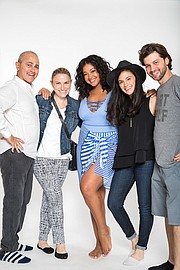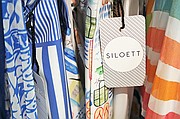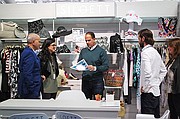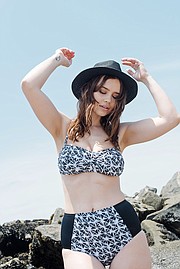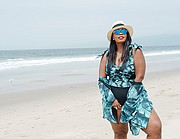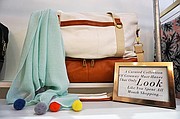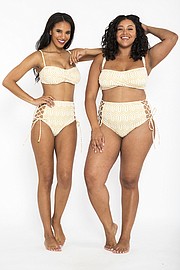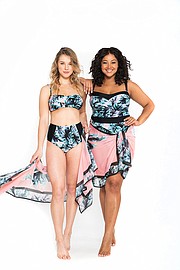SWIM/SURF
Siloett Gets a Made-for-TV Makeover
Ever since appearing on “The Profit” reality show in June, Chuck Handy Jr. has been slammed.
“We’ve had thousands of hits on our website. It’s been crazy,” Handy said. “Yesterday I had almost 400 emails.”
The second-generation apparel manufacturer spent his career working in the swimwear business for companies including Jaycee Swimwear, Jordache and A.H. Schreiber before setting out on his own to launch Swim by Chuck Handy in 2010. Handy’s concept: create a collection of misses and plus-size swimwear that would be sold as a set with a matching cover-up. But by late last year, when Handy and his family met with entrepreneur Marcus Lemonis, the founder and star of CNBC’s “The Profit,” Swim by Chuck Handy was drowning in debt due to crushing interest fees owed to its factor.
Under Lemonis’ guidance, the swimwear company got a new name—Siloett—and a new direction. The new company would continue to create misses and plus-size swimwear as well as matching cover-ups—but they would not be sold as a set. And that was just the beginning. In addition to swimwear and cover-ups, which are made in America, the Siloett brand also includes sportswear and accessories, including bags, hats, shoes, scarves and sunglasses. And there are more product extensions on the way.
“It merchandises together,” Handy said. “You can buy a hat, put a scarf on, put the shoes on, put a cover-up over your swimsuit and you are styling. It’s a big-buck look, and it’s competitive with other companies that are manufacturing in Asia.”
Handy described the collection as the “upper tier of moderate.” Swimsuits are wholesale priced “in the $80 range,” and the collection includes one-pieces and swim separates.
Integral to the rebranding effort was Handy’s daughter, Mary Ellen McAteer, who stepped into a new role as president and designer of Siloett. McAteer had studied fashion design at Drexel University but ended up working as a technical designer and fit specialist for large retail chains.
“I’ve been out in the corporate market,” McAteer said. “I’ve worked at Dressbarn. I’ve worked at Destination Maternity. I learned everything from a corporate perspective to bring back to the mom-and-pop perspective.”
Siloett is truly a family business. There were two Chucks at Swim by Chuck Handy, father Chuck Handy Jr. and son Chuck III—referred to as Charlie on “The Profit.” Mother Mary Lou Handy, a middle school teacher and former assistant dean at Cornell Medical College, oversaw the books for the swim business. For the relaunch, it was all hands on deck as McAteer redesigned the collection, Chuck Handy Jr. leveraged his many contacts in the swim business to find domestic factories, and Charlie Handy oversaw just about everything else. Among the tasks assigned to him was creating a custom trade-show booth for the brand’s relaunch at Curve New York in February. The booth was built by another Lemonis company, Precise Graphix, based in Allentown, Penn., and Charlie Handy found himself putting in 20-hour days traveling between New York and Pennsylvania to oversee the project. Fortunately, this was familiar territory for Handy.
“I started working with my dad in 2005,” Charlie Handy said. “I ended up learning the business from the ground up. I knew warehousing, shipping, all that jazz. I’ve really grown up in the whole business.”
It was Charlie Handy who first pitched his family to “The Profit.” This was also familiar territory for him. He had appeared on MTV’s “Dating Naked” reality show in 2014.
“I’ve been on camera before, and I know my parents’ personalities,” Charlie Handy said. “I said, ‘You guys are camera gold.’”
Since the show wrapped, Charlie Handy is going on to work on another one of Lemonis’ projects, overseeing the construction of new stores.
“My goal was to keep this company alive and keep my family employed,” he said. “I’m happy everybody is working and I have the opportunity to do my own [thing] now.”
For McAteer, the transition hasn’t just been from the corporate world to helming what essentially is a startup brand. When the show began filming, McAteer had left her corporate job to be a stay-at-home mom to her then-11-month-old daughter.
“I was on maternity leave, I left Dressbarn and I decided not to go back because I enjoyed staying home with my daughter,” McAteer said. “All of a sudden this opportunity presented itself and I wasn’t ready to go back to work. But sometimes life has funny timing.”
McAteer joined the company and brought her daughter along to work with her in the company’s office in Ridgewood, N.J. (The company also has offices and showrooms in New York and Los Angeles.)
“I wasn’t ready to let go,” McAteer said. “We started filming back in December. It’s now June and I just now said, ‘Maybe I need to hire a nanny.’ I’m not a big outsourcing person. I like having my hand on the product. So when it came to my daughter I’m the same way.”
To create the collection within the three-week window needed to meet the show deadlines, McAteer designed the line during her only free hours.
“I designed this collection between the hours of midnight and 4 a.m.,” she said. “My daughter was fed and I went to work. It took me one week to get everything designed.”
She then had two weeks to print fabric, produce the collection and create a catalog.
The family worked with another Lemonis company, Printed Village, on the original fabric prints featured in the launch collection. Los Angeles–based Printed Village crowdsources designs from graphic designers from around the world.
“We have designs from artists from Brazil, Australia, England, New Jersey, New York and Brooklyn,” McAteer said, explaining that the artists get paid for the print and the company gets a royalty from items made using the print.
“We’re getting really beautiful artwork that just happens to work for swimwear. I think it sets us apart,” she said.
The company purchased a bulk order of a Japanese fabric—a 70 percent nylon/30 percent spandex blend—that features a special construction that made it ideal for digital printing. The fabric’s yarns have a triangular shape, which allows for considerably better ink coverage and less “grin-through,” or the effect of seeing the original base color of the fabric when it is stretched.
“The Japanese fabric is great,” McAteer said. “It’s strong and shapes the torso beautifully but still maintains a soft hand and [is] quite comfortable—something that is hard to achieve!”
McAteer said Siloett suits retain their shape wear after wear and, unlike other shaping suits, are comfortable enough to keep on all day.
The fabric was printed locally—in Fairlawn, N.J.
“We printed the fabric domestically since our swimsuits and cover ups are sewn here in New York and New Jersey,” McAteer said. “So we really own the process from beginning to end!”
The launch collection features three capsules. The “Tonal Sophisticate” group features black-and-white suits with a pop of coral.
“It got a fantastic review at our first trade show,” she said. “They filmed quite a bit of that capsule at the show, and it sold out because everyone saw it on TV.”
The “Coastal Chic” group is geared to the classic New England consumer with a new take on nautical in white, blue and coral in place of the traditional red. The “Vintage Cabana” group is an homage to swimwear prints, McAteer said. The group is designed for the on-trend consumer who is not afraid to mix and match prints for a coordinated look.
“Down to the sunglasses, everything is merchandised by customer,” McAteer said. “When you look at the collection, even the basic T-shirts and the poly chiffon cover-ups are in specific colors per capsule.”
But when it comes to the prints, McAteer worked on finding the perfect mix of style and pattern.
“It’s easy to drop the same print into a hundred body styles,” she said. “It’s a lot harder to find out which is the right body style and only offer one. That’s where the merchandisers do their work. We’ll give you one and it’s the right one. You’re not getting overlapping styles in the group. It takes a lot of the guesswork out.”
Throughout the relaunch of the company one thing remained the same: Chuck Handy Jr.’s commitment to creating misses and plus-sized swimwear.
“Your size doesn’t dictate whether you’re fashionable or not,” McAteer said. “We wanted to make fashion attainable. Everyone should have access to it.”
Siloett swimwear sizes run from 2 to 26. Sportswear runs from size 0 to 28. To drive home the message about the range in fit, the Handys included both misses and plus-sized models in the company catalog.
“Because the curvy fit is different, we have a curvy fit model,” McAteer said. “In the photo shoot we used the size 18. We didn’t photograph the 12 and call her the plus. We went with our fit samples and photographed those. Those are true 18s. And it makes a difference.”
McAteer’s heart may be in design, but her experience is in the design development process—and that is what she tried to impress on Lemonis during the filming of “The Profit.”
“I looked at the whole TV show as a job interview,” she said. “At the end of the day Marcus didn’t have to invest in us. If we wanted to do this right we had to do it to a T.”
McAteer said she wanted to make sure Lemonis understood that even though the company had run into financial difficulties, there were many things the family had done well.
“We’d been three people and doing just under $3 million in sales in an industry surrounded by really big players. We may not have had the whole thing together, but we were doing something right.”
Swim by Chuck Handy had built a following among a niche clientele in the swim business, McAteer said.
“We needed the process, but everything else was there. We had the quality. We had the niche clientele. We just needed an infusion of money and an infusion of process.”
On “The Profit,” once Lemonis decides to invest in a company, it becomes part of his portfolio of brands. Siloett is now part of the Marcus Lemonis Fashion Group, said group President Stephanie Menkin.
“Marcus connected with the Handys right away,” Menkin said. “He called me and said, ‘You’re going to love these guys.’ One of Marcus’ strengths is that he sees the value of people. Mary Ellen is fantastic at tech packs and every little detail of design. Charlie is a character, but he can implement ideas really well and he’s creative as well. Right now I’m learning a lot from Chuck Jr. He’s very knowledgeable—has great contacts. He really understands the swim business. Mary Lou sits on the side a bit—she does have an outside job, but she really runs that family. She’s the mama of all mamas. They’re good people with a good work ethic. They’ve been an interesting addition to the team. They brought really good hustle.”
Each business Lemonis invests in falls into a different vertical or pillar of his business, from food to manufacturing to Menkin’s fashion group, which includes apparel, accessories, beauty and home.
“It’s complete financial control from the minute you shake hands,” Menkin said. “For a lot of people that’s a tough process. These small businesses are used to doing everything themselves and monitoring their cash flow from a checking account perspective versus actual daily bookkeeping. It’s hard for them to let go of that.”
Within each group there are shared services. For example, there is an in-house e-commerce and creative division that builds the websites for the companies in the fashion group, including Siloett’s website, http://shopsiloett.com. Companies under the Lemonis umbrella get to take advantage of economies of scale, which can mean lower shipping rates or better insurance rates because they’re part of a larger parent company, Menkin said.
Companies in the group also get to work with Lemonis and Menkin and other executives to come up with strategies for growing the business.
“When Marcus says he’s 100 percent in charge, it’s no joke,” Menkin said. “What he says goes. But, I mean, the guy knows a thing or two about a thing or two.”
